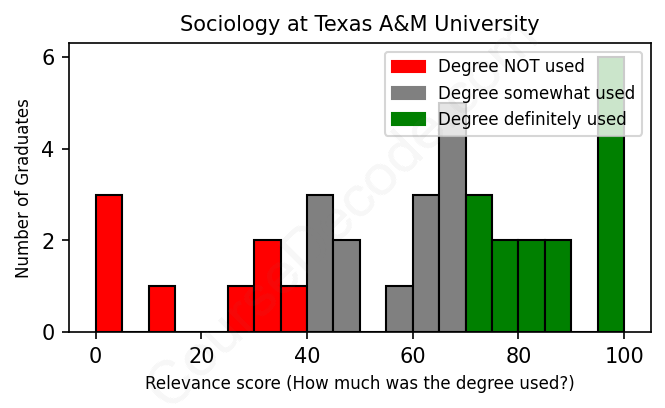
First, some facts. Of the Sociology graduates from Texas A&M University we've analyzed , here's how many have used (or NOT used) their degree in their career:

These are estimates based on AI analysis of 37 LinkedIn profiles (see below).
The verdict? Below average. Overall, with an average relevance score of 60%, Sociology graduates from Texas A&M University have a lower likelihood (-7%) of finding work in this field compared to the average graduate across all fields:
And for comparison, here's the chart for all profiles we've looked at across all degrees.
Also, after graduating, only 27% of these graduates have pursued further education other than another Bachelor's degree (such as a Masters degree or other), compared to the average across all profiles of 35%. This suggests a Bachelors degree is enough for most Sociology graduates, and it's normal to look for work straight after graduation.
See the details:
|
Relevance score: 58% We think this person has gone into a career only somewhat relevant to their degree. We think this person has gone into a career only somewhat relevant to their degree.
DEGREE INFOGraduated in 2016 from Texas A&M University with a Bachelors Degree in Sociology. Also pursued further education since (see below). JOB HISTORY SINCE GRADUATIONIntern Belle of the Ball Jan 2017 - Jun 2017 Graduate Teaching Fellow  KIPP Texas Public Schools - Houston Jun 2017 - May 2020 PreK4 Teacher  Second Baptist School Jun 2019 - Aug 2021 Realtor Associate  Nan and Company Properties Jun 2021 - Jan 2023 Realtor Sales Associate  eXp Realty Jan 2023 - Oct 2023 Realtor Associate  Compass Oct 2023 - Present FURTHER DEGREES DONE SINCE GRADUATINGMATRelay Graduate School of Education 2017 - 2020 ABOUTNo information provided. |
The top 10 most common jobs done by the graduates we've analyzed (ranked most common to least) are:
Here is a visual representation of the most common words in job titles for Sociology graduates (this is across all Sociology graduates we've analyzed, not just those who went to Texas A&M University):

Graduates from the Sociology program at Texas A&M University seem to have a fairly diverse set of career trajectories. For many of them, their first jobs right after graduation are often in roles such as administrative assistants, interns, or entry-level positions in areas like law, nonprofit work, or education. Over the years, some graduates find their footing in fields more closely aligned with their sociology degree, working in social services, community development, or human resources. For example, several have moved into roles like caseworkers or program managers, which leverage their understanding of social structures and human behavior.
Looking further down the line, around five to ten years post-graduation, many individuals have made considerable strides in their careers. Some have advanced into management positions or specialized roles within nonprofit organizations, public service, or corporate sectors, while others have taken on leadership roles within law firms or educational institutions. However, there are also graduates who seem to have drifted into careers that may not directly link back to their sociology backgrounds, like sales or various administrative jobs in less relevant fields. Overall, it seems that while many sociology graduates from Texas A&M achieve success and find fulfillment in jobs that align well with their studies, there's a noteworthy mix, with some ending up in more tangential roles as well.
Hey there! Honestly, a Bachelor’s degree in Sociology can be a mix of challenging and manageable, and it kind of depends on your interests and strengths. At Texas A&M, like anywhere, you'll dive into topics like social behavior, culture, and inequality, which can be super fascinating if you’re into understanding how society works. Some classes might require heavy reading, research papers, and group projects, but if you enjoy discussing social issues and doing some critical thinking, it shouldn't feel too brutal. Overall, I’d say it’s about on par with other liberal arts degrees—not the easiest, but definitely not the hardest either. Just make sure you stay on top of your assignments, and you’ll do fine!
Most commonly, in the LinkedIn profiles we've looked at, it takes people 4 years to finish a Bachelor degree in Sociology.
Looking at these Sociology graduates from Texas A&M University, it seems like a mixed bag in terms of the money they've made. The one who became a partner at a top law firm is definitely pulling in some serious cash, possibly in the six-figure range, which is pretty great! Others, like those who work in education or various non-profits, likely have salaries that are on the lower end of the spectrum, which isn’t uncommon in those fields. Some of them have also had roles in government and military, where pay can vary but sometimes comes with good benefits and job stability. Overall, while some are likely doing well financially, others might not be raking in the big bucks, especially if they chose fields driven by passion rather than a paycheck.
Here is a visual representation of the most common words seen in the "about" section of LinkedIn profiles who have a Bachelor degree in Sociology (this is across all Sociology graduates we've analyzed, not just those who went to Texas A&M University). This may or may not be useful:

Here are all colleges offering a Bachelor degree in Sociology (ordered by the average relevance score of their Sociology graduates, best to worst) where we have analyzed at least 10 of their graduates: